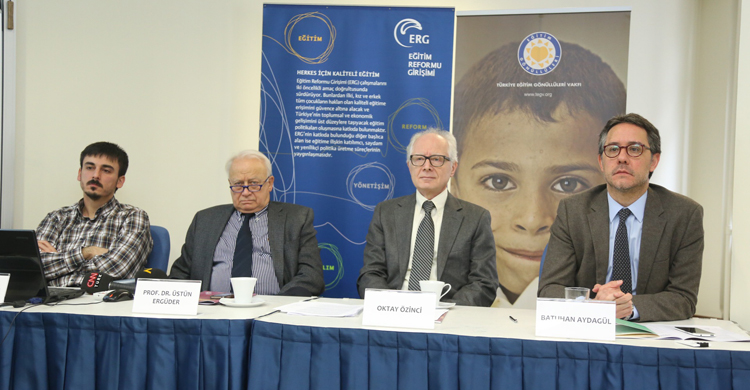27/03/2014
ERI shared the Observation of Fundamental Education Stages Research Report and Policy Note with the public
March 10, 2014, Istanbul - Education Reform Initiative (ERI) and the Education Volunteers Foundation of Turkey (TEGV) completed the observation and assessment study on the new "4+4+4" fundamental education stages scheme implemented by the law numbered 6287.The report titled Observation of Fundamental Education Stages, and the associated policy recommendations by ERI analysts was shared with the public at a press conference on Monday, March 10.

Issued by ERI in association with TEGV, the report compares the education outputs and school environment of 5th grade students currently in the 8-year continuous education program, and other 5th grade students in the new 4+4-year, interrupted program. The report also discussed the election process for elective courses available in 5th grade curricula. Quantitative research was based on a population of 1894 students from 33 provinces. For qualitative research, 63 students from 9 Turkish provinces were interviewed. Interviewees were asked about the changes from the 4th grade to the 5th grade, how such changes affected them, and their experience and perception of elective courses.
ERI recommends four policy pillars based on research findings:
• Adaptation programs in the 4th and 5th grades to introduce students to the changes ahead (change of school, working with branch teachers, and elective courses) will help to reduce issues during the transition phase. Ministry of Education's plans to start a similar pilot study for 5th grades in the 2014-15 academic year is an important step. A similar program must urgently be designed and implemented for branch teachers as well.
• MoE's investment budget must be increased in order to enable full-day schooling in all schools and to fund the need for additional classrooms that will arise as a result. The current MoE investment budget set forth in top-level policy documents appears far from adequate to allow primary and secondary school students to receive education in discrete environments.
• School meals must be considered in public schools. The new stages extend class hours in secondary schools and expand the implementation of morning and afternoon sessions, which result in fewer students being able to eat lunch or breakfast.
• At least 26,000 additional personnel must be appointed to secondary schools. While class hours in secondary schools increased by 23% in the 2012-13 academic year, the number of full-time primary school teachers increased only by 6%. Even though weekly class hours were reduced from 37 to 35 in the 2013-14 academic year, the current number of full-time teachers is far from meeting the additional demand.
ERI Chairperson Professor Üstün Ergüder said the following about the policy note: "Policymaking processes in education are in need of revision. It is imperative that the political preferences of the government are blended with participatory processes and fact-based findings by the bureaucracy. The lack of exhaustive discussion on the government's objectives for introducing stages to compulsory education, and limited use of research findings during the process for adopting the law numbered 6287 caused predictable and avoidable issues in implementation. Based on the policy note, this research report presents a critical issue, and points out that socioeconomically-disadvantaged children were more severely affected by the issues that arose during the 2012-13 academic year. It is critical that the improvement efforts of the Ministry are planned with consideration for gender, socioeconomic status, students with special needs, and other risk groups."
TEGV Chairperson Oktay Özinci said the following about the research: “Turkey made great investments in education in the last decade. We had considerable success in areas like the access of children to school. However, similar improvements were not observed in quality of education and learning outputs. Our education system does not improve simultaneously with our efforts to become one of the most developed economies of the world. Equality is another issue. We are unable to distribute the right and opportunity for quality education equally between social segments, regions and schools. We must lose no more time in building an education system that will equip our children with the knowledge, skills and values they will need to become competitive, happy and lifelong-learning individuals in the 21st century. TEGV's mission is to contribute to fundamental education in Turkey and enable children to make use of equal and quality education opportunities. We strive to accomplish this mission through education services provided by education offices throughout the nation. Furthermore, we provide support to education through projects such as these. In conclusion, we believe that such research provides important input to the development of the education system in Turkey."
About the Education Reform Initiative:
Education Reform Initiative (ERI) mobilizes a wide range of stakeholders in research, advocacy, and training to attain its goal of “quality education for all.” Launched within Istanbul Policy Center at Sabancı University in 2003, ERI aims to improve education policy and decision-making through participatory and fact-based education policy processes. ERI hosts the Best Practices in Education Conference, and issues an annual Education Monitoring Report to assess developments in education and share findings with the public. ERI is supported by Mother and Child Education Foundation, Aydın Doğan Foundation, Bahçeşehir University, Borusan Kocabıyık Foundation, Elginkan Foundation, Enerji-Su, Enka Foundation, İstanbul Bilgi University, İstanbul Kültür University, Kadir Has Foundation, Mehmet Zorlu Foundation, MV Holding, Nafi Güral Education Foundation, Sabancı University, The Marmara Collection, Association of Private Education Institutions, Vodafone Foundation of Turkey, Vehbi Koç Foundation and Yapı Merkezi.





